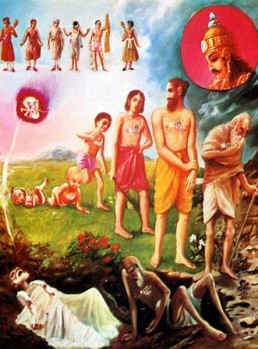Swami Chinmayananda
Swami Chinmayananda Commentary
In describing the attributes of a Perfect Sage, having explained that he is one who has come to sacrifice all his petty desires, in his self-discovered self-satisfaction in the Self, Krishna explains that, another characteristic by which we can recognise a sage, is his EQUANIMITY IN PLEASURE AND PAIN. If, in the last stanza, Krishna considered the man as an “actor,” herein he is considering him as an “experiencer,” A BEARER OF BODY-AFFLICTIONS.
One who is a stable being, whose heart is undisturbed in sorrow or in joy, unattached, fearless, and sans-anger, is described here as a Muni — a silent sage. Of the emotions that must be absent in an individual, who is a master in all situations, we are here pointedly told only of these: (a) attachment (Raga), (b) fear (Bhaya) and (c) anger (Krodha).
In fact, when we read the biographies of perfected-ones, in the entire history of man, we find in almost all of them an antithesis of the ordinary man. The hundred emotions common to the ordinary man are not at all seen in a Perfect-one, and therefore, we feel surprised, when the absence of only these three qualities is asserted so emphatically here. Naturally a careful student gets suspicious. Has Vyasa overlooked all other features? Can this be a complete statement? But on a closer study we shall discover that, he has not committed “the crime of inappropriate emphasis upon the non-essentials,” as critics have been tempted to point out.
In the previous stanza we were told that “he is Perfect who has forsaken all cravings that bubble up in his mind,” and this stanza asserts the mental stability of such a one. In the world outside, in our intercourse with the sense-objects, we can very easily realise that our attachments with things create in us the pains of the perplexing fear-phobia. When an individual develops a desire strong enough to make a deep attachment, instinctively, he starts entertaining a sense-of-fear for the non-winning of the object so deeply desired; and, if it has been secured, then again he fears for the security of the same acquired object.
Similarly, when an object has charmed one to a point of deep attachment, and when fear itself has started coming up in waves to disturb the individual, then, such an individual’s attitude towards those that come between him and the object of his attachment, is called ANGER. Anger is thus nothing but a feeling that rises in us, because of our attachment to an object, towards an obstacle between ourselves and the object of our attachment; the anger thus arising in a bosom is directly proportional to the amount of fear one entertains on the score of the obstacle holding one back from winning one’s object-of-love. Anger, therefore, is only our Raga for an object, expressed at an obstacle that has come between us and the object of our desire.
Shankara says that a Man-of-Steady-Wisdom is not distressed by calamities (a) such as those that may arise from the disorders of the body (Adhyatmika); (b) those arising from external objects, such as tigers, etc. (Adhibhautika); and (c) those arising from unseen causes such as the cosmic forces causing rains, storms, etc. (Adhidaivika). Fire increases when fuel is added. But the ‘fire of desire’ in a Perfect One does not increase when more pleasures are attained. Such a person is called a man-of-steady-Knowledge, a silent, serene sage.
MOREOVER:
Adi Sankara Commentary
Moreover, that munih, monk [Sankaracarya identifies the monk with the man of realization.] ucyate, is then called; sthita-dhih, a man of steady wisdom; when anudvignamanah, his mind is unperturbed; duhkhesu, in sorrow — when his mind remains unperturbed by the sorrows that may come on the physical or other planes [Fever, headache, etc. are physical (adhyatmika) sorrows; sorrows caused by tigers, snakes, etc. are environmental (adhibhautika) sorrows; those caused by cyclones, floods, etc. are super-natural (adhidaivika). Similarly, delights also may be experienced on the three planes.] –; so also, when he is vigata-sprhah, free from longing; sukhesu, for delights — when he, unlike fire which flares up when fed with fuel etc., has no longing for delights when they come to him –; and vita-raga-bhaya-krodhah, has gone beyond attachment, fear and anger.
The Bhagavad Gita with the commentary of Sri Sankaracharya – Translated by Alladi Mahadeva Sastry
Holy Geeta – Commentary by Swami Chinmayananda
The Bhagavad Gita by Eknath Easwaran – Best selling translation of the Bhagavad Gita
The Bhagavad Gita – Translation and Commentary by Swami Sivananda
Bhagavad Gita – Translation and Commentary by Bhaktivedanta Swami Prabupadha
Srimad Bhagavad Gita Chapter 2 – Verse 56 – 2.56 duhkheshv – All Bhagavad Gita (Geeta) Verses in Sanskrit, English, Transliteration, Word Meaning, Translation, Audio, Shankara Bhashya, Adi Sankaracharya Commentary and Links to Videos by Swami Chinmayananda and others – 2-56

